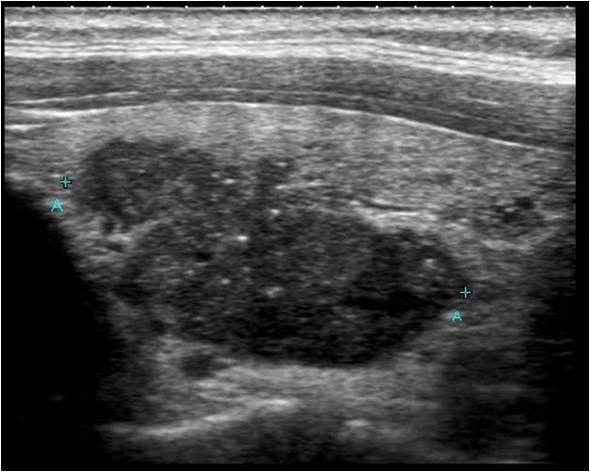Kroeker: The thyroid is a very small butterfly-shaped gland. If you feel that little sternal notch, that little V on your chest, the thyroid is just above that level.
Rigby: And so what does the thyroid do and what do those hormones help control?
Kroeker: To name a few examples, it affects the way your brain functions, your skin tone, your hair texture, your digestive system, your metabolic rate, so many things. It essentially controls your entire body the way it functions.
Rigby: Why are rates of thyroid cancer going up?
Kroeker: We are finding more thyroid cancers because more ultrasounds are being done of thyroids. The more thyroid nodules you find and you evaluate with biopsies, the more cancers you will diagnose and treat. So that’s a big reason, I think, why the rate is going up.
Rigby: This is a relatively slow-growing cancer. Is that part of the reason it’s survivable?
Kroeker: Yes. Most thyroid cancers are not considered aggressive cancers. The lifetime survival of the more common types of thyroid cancer is greater than 98 percent, so very few people die from thyroid cancer.
Rigby: What are some of the symptoms of thyroid cancer people may experience?
Kroeker: There are very few symptoms of thyroid cancer. Most people with thyroid cancer feel great. You might feel some pressure in your neck at that level just above your collarbones. You might have problems swallowing where it actually feels like food gets stuck at that level. Or you may have some hoarseness. But there are very few symptoms of thyroid cancer. And so that’s why it’s so important for someone to feel your neck. Your primary care physician or your OB should be feeling your thyroid on a regular basis. If they feel something then you would be evaluated with an ultrasound which is the best way to look at thyroid nodules. It’s non-invasive, it’s cheap and there’s no radiation involved.
Rigby: You are a surgeon. What should people look for in a physician if they need thyroid surgery?
Kroeker: You should be looking for someone who does a large volume of thyroid surgery to decrease the risk of complications in the operating room associated with thyroid surgery.
Rigby: Is it always necessary to remove the entire thyroid gland?
Kroeker: Not necessarily. If you are a low-risk patient, if your thyroid cancer is under four centimeters on one side of your thyroid and the other thyroid lobe is totally normal, you can be treated with just removing one half of the thyroid gland.
Rigby: What happens after surgery?
Kroeker: So if you have your entire thyroid removed, you need thyroid hormone. Thyroid hormone is so important for your body to run. So you have to take one thyroid hormone pill every day for the rest of your life. The only additional treatment for the cancer that you may or may not need, because not everyone needs it, is a type of radiation called radioactive iodine. And it’s a pill that you take. The goal with that is to ablate any microscopic thyroid cancer cells in your neck.
Rigby: So if you get a diagnosis of thyroid cancer, you should know that there is a lot that can be done for you.
Kroeker: There’s nothing great about having cancer, but the best thing about this thyroid cancer is that it’s so treatable. They end up having a long, happy, healthy life, most patients, after having surgery for thyroid cancer.
Rigby: Dr. Teresa Kroeker, Texas Thyroid and Parathyroid in Austin. Thank you so much for your time.
Kroeker: Thank you, Wendy.



